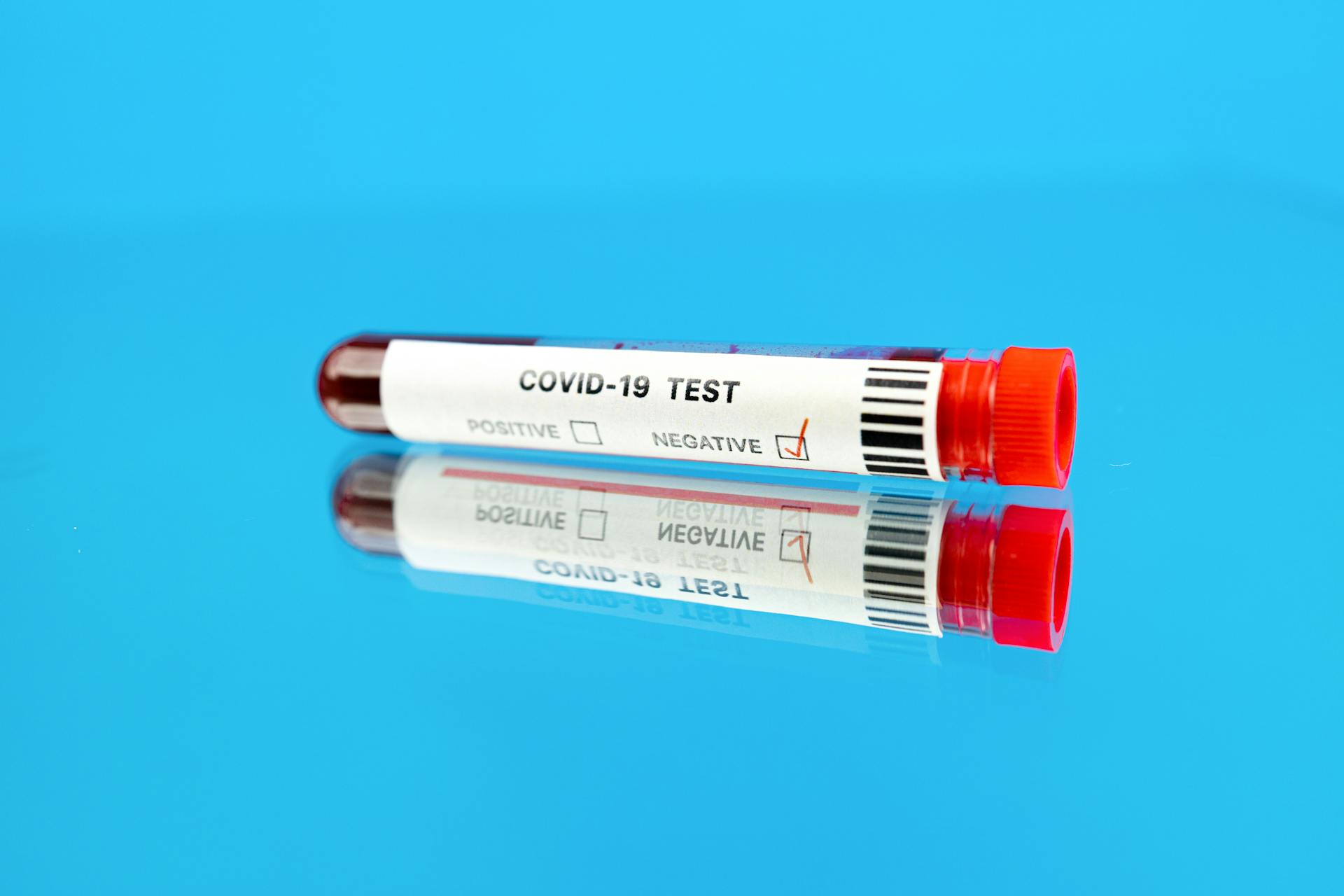
If you're facing a medical emergency that requires a blood transfusion, you're likely worried about the cost. Most health insurance plans cover blood transfusions, but there are some exceptions and limitations to be aware of.
Typically, insurance covers blood transfusions for life-threatening conditions, such as severe bleeding or trauma. This includes emergency situations where a blood transfusion is necessary to save a person's life.
The cost of a blood transfusion can vary depending on the type of procedure and the number of units of blood needed. On average, a single unit of blood can cost anywhere from $100 to $200.
In some cases, insurance may not cover blood transfusions for elective procedures, such as surgery. This means that you may need to pay out-of-pocket for the procedure.
If this caught your attention, see: Re Organize Health Insurance in America
Insurance Coverage for Blood Transfusions
Insurance coverage for blood transfusions can vary widely depending on your specific plan. Typically, you're responsible for the cost of the first three units of blood each year, unless it comes from a blood bank or is donated specifically for your transfusion.
If you receive a blood transfusion as a hospital inpatient, Medicare Part A hospital insurance covers your care. You pay nothing if the hospital gets the blood from a blood bank. However, you are responsible for your Medicare Part A deductible, which is $1,676 for each benefit period in 2025.
Medicare Part B medical insurance helps cover blood transfusions you receive in an outpatient setting. You must be enrolled in Medicare Part B and will be responsible for your deductible, which is $257 in 2025. You'll also have an out-of-pocket copayment for handling and processing services.
If the healthcare provider is enrolled in Medicare and gets the blood from a blood bank, you won't have to pay for the blood and won't have to replace the first three units through donations. If the provider has to buy the blood, you'll either pay for the first three units or replace them through donations.
Medicare pays for the cost of blood after the first three units, regardless of the setting. If you have a Medicare Supplement Insurance (Medigap) plan, it may reduce your out-of-pocket medical expenses, including costs related to blood transfusions.
Here's a breakdown of the costs associated with blood transfusions under Medicare:
- Medicare Part A: You pay for the first three units of blood each year, or replace them through donations. You also pay the Medicare Part A deductible, which is $1,676 for each benefit period in 2025.
- Medicare Part B: You pay the Medicare Part B deductible, which is $257 in 2025, and an out-of-pocket copayment for handling and processing services.
- Medicare Advantage: Benefits vary across plans, with some requiring policyholders to pay for their first three units of blood and other plans covering some or all of the costs.
It's essential to review your insurance policy details and understand your coverage for blood transfusions. You can also contact your insurance company to confirm the specifics of your coverage and verify that the chosen lab is in-network.
Costs and Coverage Details
Your out-of-pocket costs for a blood transfusion can vary widely from less than $200 to well over a thousand dollars per unit of blood, depending on where the transfusion takes place and where the blood comes from.
Original Medicare — Medicare Part A and Part B — cover blood transfusions in different ways and in different medical settings. You are responsible for the cost of the first three units of blood each year — unless it comes from a blood bank or it is donated specifically for your transfusion.
You can donate blood ahead of time in some cases, or a friend or family member may also donate blood on your behalf. If the hospital has to buy the blood, the individual's cost-sharing responsibilities depend on whether the transfusion is paid for under Part A or B.
Medicare Part A hospital insurance covers your care if you receive a blood transfusion as a hospital inpatient, and you pay nothing if the blood for your transfusion comes from a blood bank. However, you have to pay for the first three units of blood you receive each calendar year, or replace the three units of blood through donations.
Consider reading: How Much Do Companies Pay for Health Insurance
You are also responsible for your Medicare Part A deductible, which is $1,676 for each benefit period in 2025. Medicare Part B medical insurance helps cover blood transfusions you receive in an outpatient setting, and you will be responsible for your deductible — $257 in 2025.
You will be responsible for your Medicare Part B deductible, and you will have an out-of-pocket copayment for handling and processing services. This amount may vary depending on where you receive treatment. If the health care provider is enrolled in Medicare and gets the blood from a blood bank, you will not have to pay for the blood and won't have to replace the first three units through donations.
Here's a breakdown of your costs for blood transfusions under Medicare:
- First three units of blood: you pay the full cost or replace through donations
- Blood from a blood bank: no cost to you
- Blood from a hospital: you may have to pay for the blood and handling/processing fees
- Medicare Part A deductible: $1,676 for each benefit period in 2025
- Medicare Part B deductible: $257 in 2025
- Copayment for handling and processing services: varies depending on the provider and location
Medigap policies supplement Original Medicare and can pay for some Medicare out-of-pocket costs, such as copays and deductibles. All Medigap plans expand Medicare's coverage for blood transfusions, with eight plans covering the first three units of blood and the other two covering a portion of the cost.
Check this out: Blue Shield Medigap Medicare Supplement Plans
Out-of-Network and Health Insurance
Out-of-network blood work can be covered by insurance, but the extent of coverage depends on your specific plan. If you have a PPO or POS plan, you may get some coverage for out-of-network services, including blood work, but it will likely be less than for in-network services.
You'll likely pay more out-of-pocket for out-of-network blood work compared to in-network services. Some plans may also require you to pay the difference between what your insurance agrees to pay and what the provider charges, known as balance billing.
If you have an HMO or EPO plan, out-of-network services are typically not covered except in emergencies or with prior authorization. This means you'll likely be responsible for the full cost of out-of-network blood work.
Understanding your plan's specifics about out-of-network coverage is crucial to avoid unexpected costs. Be sure to check with your insurance company about your plan's details.
Here are some types of health insurance plans and their typical out-of-network coverage:
- PPO: may offer some coverage for out-of-network services, including blood work
- POS: may offer some coverage for out-of-network services, including blood work
- HMO: typically does not cover out-of-network services except in emergencies or with prior authorization
- EPO: typically does not cover out-of-network services except in emergencies or with prior authorization
Finding and Understanding Coverage
Medicare Part A covers hospital care, including blood transfusions, but you're responsible for the first three units of blood you receive each calendar year. You can also choose to replace the three units of blood through donations.
Medicare Part A has a deductible of $1,676 for each benefit period in 2025. You'll pay nothing if the blood for your transfusion comes from a blood bank, but if the hospital has to buy the blood, your cost-sharing responsibilities will depend on whether the transfusion is paid for under Part A or B.
To find blood work covered by insurance, you should understand your coverage by reviewing your insurance policy details. Look for information about laboratory services or diagnostic tests to see if in-network versus out-of-network providers are covered and what your costs might be.
Preventive tests are usually covered without cost-sharing under the Affordable Care Act (ACA), while diagnostic tests may involve out-of-pocket costs. Discuss with your doctor about the nature of your test to understand what to expect.
Curious to learn more? Check out: Blue Shield Covered California
In-network providers typically come with lower out-of-pocket costs, as insurance companies have negotiated rates with these providers. Find an in-network lab by using the search tool on your insurance company's website or by calling customer service.
Here are the factors that can affect how your blood work is covered:
- Type of Plan: Different types of health insurance plans offer varying degrees of coverage.
- In-Network vs. Out-of-Network: In general, you'll pay less if you use an in-network lab because insurance companies have negotiated lower rates with these providers.
- Preventive vs. Diagnostic: If the blood work is part of preventive care, many insurance plans cover it fully.
- Deductibles, Copayments, and Coinsurance: Depending on your plan, you may need to pay a deductible before your insurance begins to cover costs.
- Prior Authorization: Some insurance plans require prior authorization for certain tests, meaning your healthcare provider must get approval from the insurance company before the test.
- High Deductible Health Plans (HDHPs) and Health Savings Accounts (HSAs): If you're enrolled in an HDHP, you'll typically pay more out-of-pocket before coverage begins, but you may also have access to an HSA, which allows you to pay for eligible healthcare expenses, like blood work, with pre-tax dollars.
By following these steps, you can help ensure that your blood work is covered by your insurance, minimizing your out-of-pocket costs.
Sources
- https://www.retireguide.com/medicare/treatments/blood-transfusions/
- https://www.helpadvisor.com/medicare/does-medicare-pay-for-blood-transfusions
- https://www.thesuperbill.com/blog/is-blood-work-covered-by-insurance
- https://www.healthline.com/health/blood-transfusion-for-anemia
- https://www.cms.gov/medicare-coverage-database/view/ncd.aspx
Featured Images: pexels.com


